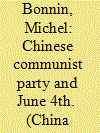| Srl | Item |
| 1 |
ID:
088597


|
|
|
| 2 |
ID:
091017


|
|
|
|
|
| Publication |
2009.
|
| Summary/Abstract |
The Tibet crisis tained the success of the 2008 Beijing Olympics. The handling of the crisis showed the CCP's rigid denial of genuine dialogue and compromise and adherence to a formula of repression and economic growth. Current leaders are enmeshed in this policy, but a new generation might well seek out policies more in tune with the quest for harmony at home and peaceful rise on the world scene.
|
|
|
|
|
|
|
|
|
|
|
|
|
|
|
|
| 3 |
ID:
148771


|
|
|
|
|
| Summary/Abstract |
During the 1980s, the immediate memory of the Maoist rustication movement expressed itself almost exclusively through the vector of literature, but since 1990, for reasons worth reflecting upon, a wide range of memorial activities have developed, involving a large number of the former educated youth (zhiqing). In the 2000s, this field benefited from the generalization of the internet and is still very much alive today. At each stage, this mainly popular or unofficial (minjian) memory had to negotiate a breathing space with a party-state still intent on controlling history and collective memory, especially concerning any topic directly linked with the Cultural Revolution. Thus, if memories of an important event are always varied because of the different personal experiences of the past and different individual situations and aspirations in the present, the spectrum of the zhiqing memories has also been complicated by political considerations. This paper does not try to present an exhaustive picture of this large memorial field; instead, through different examples, it attempts to reflect upon the meaning of the strong memorial aspirations of the zhiqing. It argues that only a genuine respect for history (as shown in the remarkable endeavours of some former zhiqing) will help this generation to transcend the conflict of memories to find meaning in its own fate.
|
|
|
|
|
|
|
|
|
|
|
|
|
|
|
|